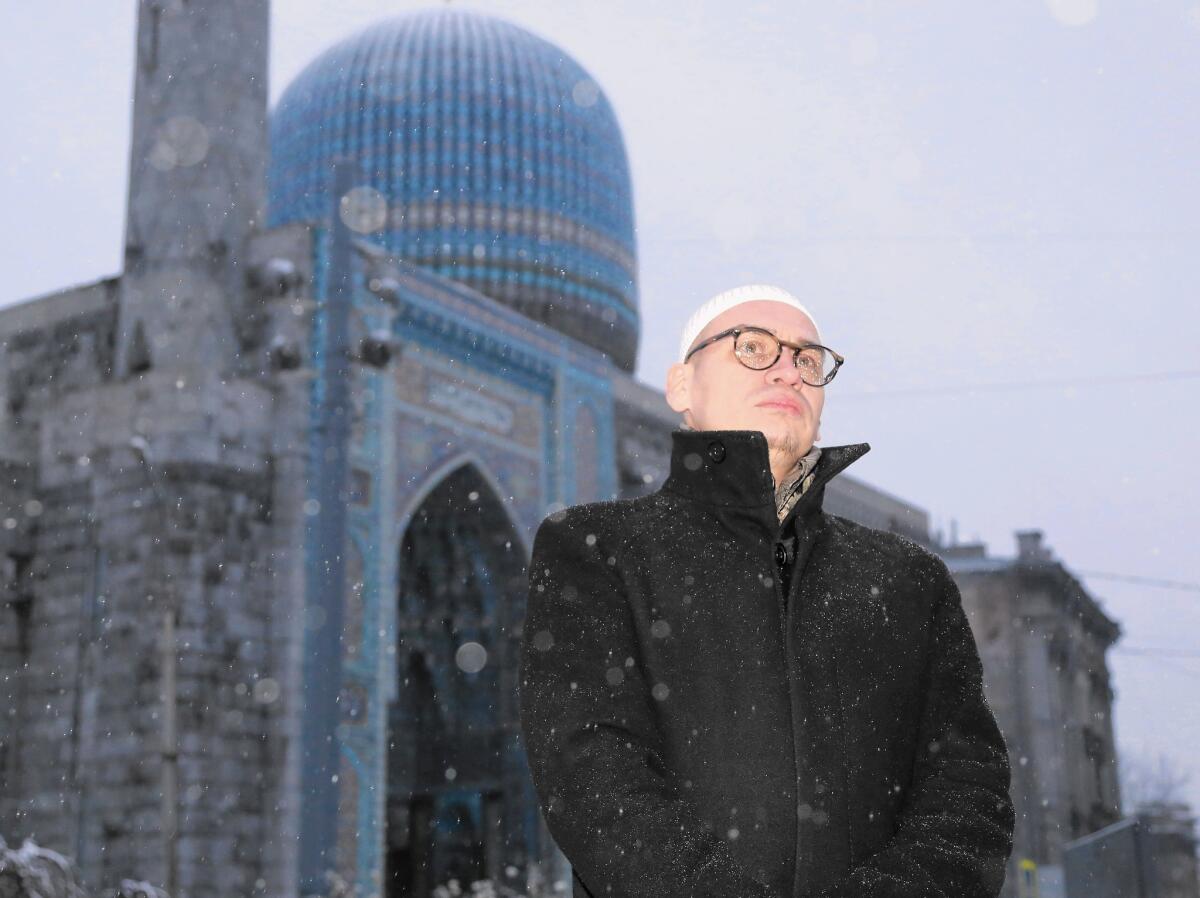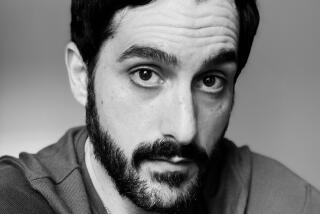Activists turn tolerant St. Petersburg into homophobic city

- Share via
reporting from ST. PETERSBURG, Russia — Timur Bulatov calls himself a “homophobic wolf,” and last summer he found his prey.
Dr. Dmitry Isaev led a commission of psychiatrists in St. Petersburg that approved hundreds of sex-change operations. To Bulatov, he was “a henchman of LGBT fascism” who corrupted Russian society by encouraging acceptance of gays, lesbians and transgender people.
After Bulatov complained to the State Medical Institute, where the doctor had practiced and taught since 2006, supervisors disbanded the commission and forced Isaev to resign.
On one of Russia’s most popular social media sites, Bulatov has listed 40 teachers and other public servants — most of them in St. Petersburg — who he said have lost their jobs as a result of his efforts over the last two years. Along with their names, ages and former jobs, he adds descriptions such as “a psychotic woman who cut off her breasts,” as he wrote about one transgender man.
The success of his campaign underscores the transformation of St. Petersburg from Russia’s most tolerant city into its epicenter of hostility toward homosexuality and transgenderism.
The nation as a whole has become increasingly hateful on those issues, with politicians seeking to ban gay rallies, blaming gays for low birth rates and advocating that they be banned from government jobs, exiled or forced into psychiatric treatment.
Taking a cue from President Vladimir Putin, who has whipped up anti-Western sentiments to advance a nationalist agenda and boost his domestic approval ratings during an economic crisis, they often frame their stance as defending the country against foreign values.
Bulatov, 40, lumps homosexuality with pedophilia as part of a “disease” deliberately spread to children and teens by Western-funded books, websites and even cartoons.
“They destroy Russia through children,” he said. “It all comes from Europe.”
See more of our top stories on Facebook >>
Founded by Peter the Great, the most pro-Western of the czars, St. Petersburg is Russia’s second largest city and cultural capital, replete with theaters and architectural marvels. In the 1990s, after the repeal of a Stalinist-era law punishing male homosexuality with jail time, the city became a magnet for gays, lesbians and transgender people.
Gay rights groups organized “Queer Fests,” LGBT film festivals and “weeks against homophobia.”
In the last few years, however, Vitaly Milonov, a member of the St. Petersburg city council, has tried to turn back the clock with an anti-Western agenda. Among the things he has tried to ban: the teaching of evolution, sexual education, MTV, Halloween, milk cartons with “homosexual” rainbows, concerts by Madonna and Lady Gaga, performances of Shakespeare’s “A Midsummer Night’s Dream” and the novel “Lolita,” written by Vladimir Nabokov, a St. Petersburg native.
In 2012, Milonov was the major force behind the council’s passage of a ban on promoting “nontraditional sexual relations,” including “sodomy, lesbianism, bisexuality and transgenderism,” to people younger than 18. It became a blueprint for the federal law that passed the next year.
The law became a key tool for Bulatov.
He combs social media looking for gays, lesbians and transgender people, or their sympathizers, working in government jobs that involve contact with minors. Parents of public school children often tip him off, he said.
Once he identifies a target, Bulatov prepares a dossier and submits it to the person’s boss. Although the government rarely enforces the law on its own, Bulatov uses it to apply pressure.
Isaev, the psychiatrist, was vulnerable because some of his students were minors. In addition, most teacher contracts stipulate that “immorality” — usually not well defined — is grounds for firing.
His now-defunct commission had approved sex-change operations at a higher rate than commissions in other cities, he said: “I am glad the commission could help that many people.”
The author of more than 120 scientific articles on gender and sexuality, Isaev eventually found a job at a private health clinic.
Rights groups say that official intolerance has helped give rise to violence by vigilante groups.
Vykhod, a gay rights group in St. Petersburg, documented 36 attacks on the city’s LGBT community in 2014, including severe beatings and assaults using mace.
“The violence has become more planned, targeted and cruel,” said Kseniya Kirichenko, a lawyer for the group. “The state supports it, leaves it unpunished.”
In an interview, Bulatov claimed that some attacks have been staged by gay rights groups to draw international support.
Bulatov, a goldsmith and jeweler whose family has lived in St. Petersburg for generations, said he wants to turn Russia into a “hell for sodomites.” He took up the cause after his only son was born 10 years ago, he said.
Though he is Muslim, Bulatov is part of the People’s Council, a nationalist group that is closely allied with the Russian Orthodox Church, strongly supports Putin and pursues a puritan agenda.
The head of the St. Petersburg branch, a 55-year-old musician and former businessman named Anatoly Artyukh, has lobbied to classify homosexuality and transgenderism as psychological disorders, written a book criticizing gay activists and created a ballet condemning gays, abortion and women without children.
Gay rights groups have accused his supporters of attacking their rallies. Artyukh denied that, but said, “We’ve done everything to make them leave town.”
The firing campaigns led by Bulatov have had a chilling effect on the homosexual and transgender community.
One victim is 28-year-old Polina Mul, who lost her job as a first-grade teacher after Bulatov filed a complaint outing her as a lesbian.
She found a new job as a deputy principal but lost that too after another complaint.
Before she moved to St. Petersburg in 2008 and moved in with her girlfriend, Mul had been living in the Siberian city of Yakutsk, where she endured scorn and beatings from her family, she said.
She said the authorities have targeted homosexuals and other minorities to divert public attention from Russia’s economic woes and widespread social ills such as alcoholism.
“That’s how our country is — we always have to hate somebody,” she said. “If we hate and abuse somebody, we unite.”
After months of unemployment, Mul found a job as a private tutor.
The fear of being targeted in one of Bulatov’s dossiers has motivated some people to censor themselves on social media or even quit their jobs to avoid being made into a public spectacle.
Egor Burtsev, a transgender man, left the state-funded health clinic where he worked as a psychologist after receiving threatening messages from Bulatov. He continued to change jobs until he found an employer who allows him to work unofficially, with his name and income undocumented.
“When Timur started writing to me, my first response was that I started shuddering at night, when I was alone,” he said. “Socially, we are the most closeted LGBT group, one of our strongest fears is the fear of disclosure.”
Yet, he said he was “lucky” to have officially changed his name and sex several years ago — because in today’s Russia, it is possible only after a court ruling in which the applicant’s name is made public.
Bulatov said he will continue his effort to destroy the man’s career.
Mirovalev is a special correspondent.
ALSO
As improved U.S.-Iran relations are celebrated, questions loom about the road ahead
In Canada, followers of pastor held by North Korea keep their faith
Jason Rezaian, journalist freed by Iran, wanted ‘to tell the truth’ about his father’s homeland
More to Read
Sign up for Essential California
The most important California stories and recommendations in your inbox every morning.
You may occasionally receive promotional content from the Los Angeles Times.










